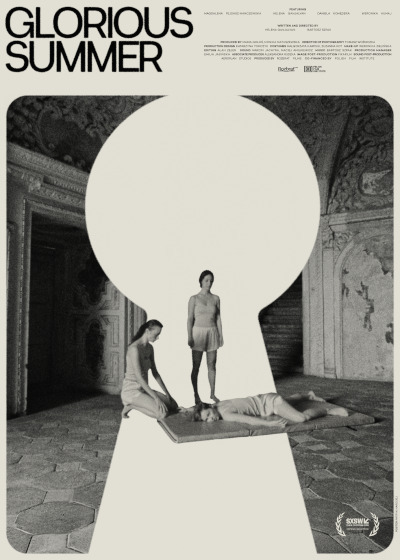Eye For Film >> Movies >> Glorious Summer (2025) Film Review
Glorious Summer
Reviewed by: Jennie Kermode

“Your world is a house and a garden. The wall marks the borders of your place. It protects you. Don’t ever cross that border,” says the message at the opening of Helena Ganjalyan and Bartosz Szpak’s film.
Three young women live in the house – though the average person would be more likely to call it a mansion or a chateau. We never learn their names – as they live alone, they have no use for them – but for convenience we might characterise them as the athletic one, the dark-eyed one and the redhead. They wear soft, flowing clothing in pale, pastel colours, finding fresh garments every day in a special room which also yields food. It’s always warm, and they have games to play when not simply lying around in the sun. Then there’s the voice. It’s not quite clear where it comes from but it has the soft yet authoritative tones of a meditation app. It floods them with positive affirmations and, at the end of each day, requires them to report on something that made them feel good.

They’re starting to struggle with this.
It’s hardest for the athletic one. She runs through the garden, blowing off steam, but one suspects it’s also because she wants to be outside and away from the voice. Increasingly, she struggles to smile when she’s supposed to. Taught assorted European languages by the voice, the women develop a language of their own – a secret one communicated through fingers where they can’t be seen. They practice falling over and playing dead, believing that if they can be convincing enough, they might get taken away to ‘the other place’. It’s not clear if any of them has ever seen another place. Memories are fuzzy.
“In your dreams, do you see things that you don’t know the names of?” one of them asks.
At first it’s the mystery that holds the viewer. What is going on here? Are the women being prepared for something? Are they there to entertain an audience? Is it simply some attempt at humane detention of prisoners? Gradually, small clues emerge: distant sounds, the trembling of the ground beneath them, building up to a startling discovery in the garden which might change everything – or nothing at all. Whilst the athletic woman and the dark-eyed one speculate and plan, they also debate how much it’s appropriate to keep from the redhead, who seems slightly younger – and as people often do in that situation, they forget she might have her own, different concerns.
The pace of the film is slow and there are a number of scenes that don’t seem to add much. Whilst we need to appreciate the women’s boredom, it feels overindulgent, as if the editor simply couldn’t bear to discard these, and risks having us get bored by them instead of with them. The film is at its most effective when we feel the urgency of their boredom – the athletic one pacing in circles like a trapped animal – juxtaposed with the languid charm of their environment. When it moves on to directly address some of the ideas at its core, we need to know why they matter.
Despite this weakness, Glorious Summer is an interesting response to generations of films about individuals trapped in too-perfect worlds which have assumed the same thoughts and behaviours, followed the same route. Its willingness to explore other possibilities gives it weight, and the build-up makes room for a profound sense of betrayal – not just of individuals but, perhaps, of our own ideas about what it means to be human – before the end. Despite its strange setting, the film is very closely tied to our own reality, and it has a good deal to say about the age in which we live. It may not quite hit the spot, but for a first feature, it’s a bold effort.
Reviewed on: 16 Mar 2025

















